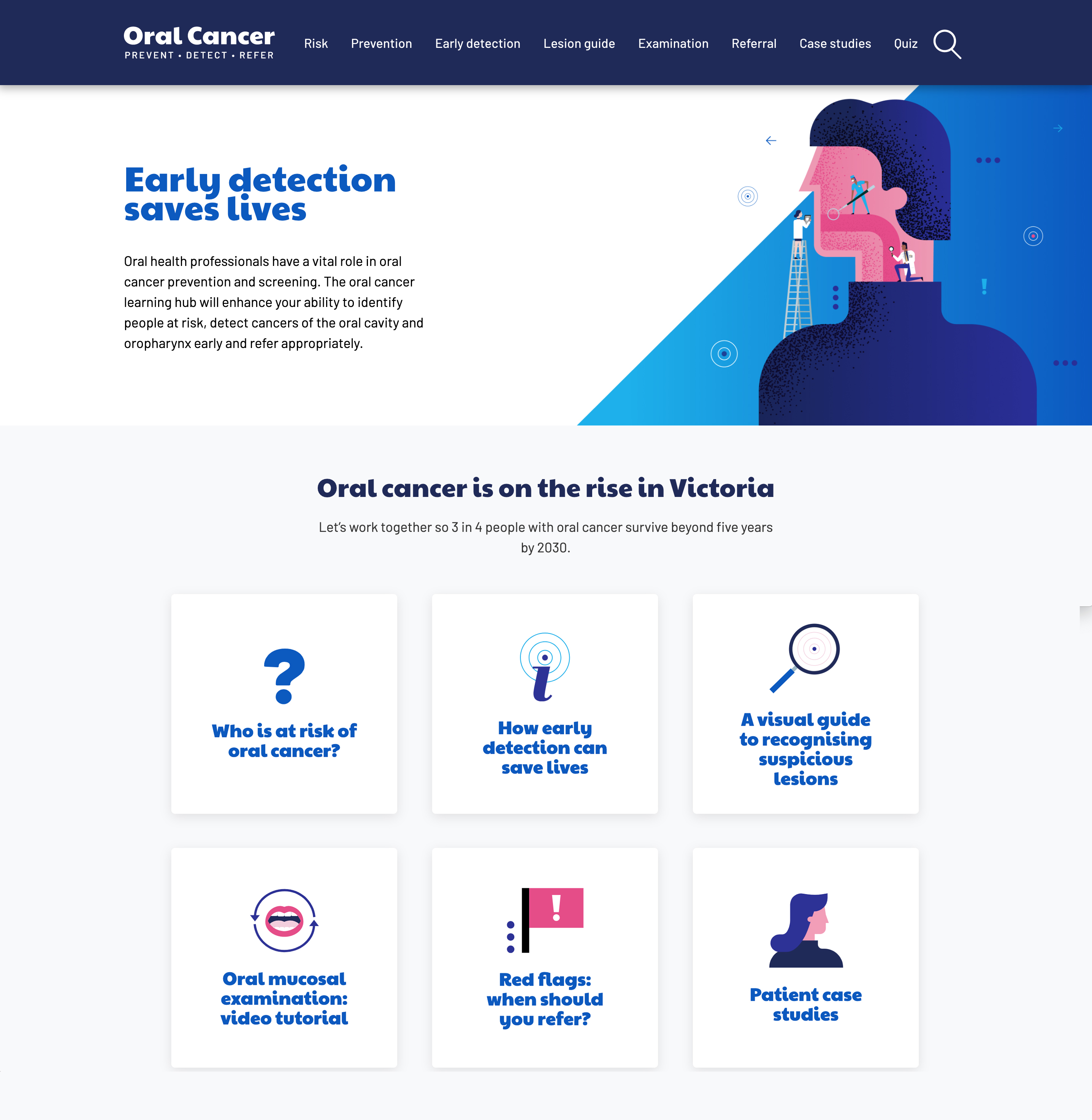Supporting oral health professionals to detect oral cancer earlier
Oral cancer is on the rise in Victoria. Today we are pleased to launch our new Oral Cancer Learning Hub.
Oral cancer continues to rise in Victoria with more than 16 people diagnosed with the disease in an average week. It is now the eighth most common cancer in men, and the 14th most common in women. Oral cancer includes cancers of the oral cavity and oropharynx.
Around three in four cases of oral cancer are linked to modifiable risk factors, notably tobacco use and alcohol consumption. The COVID-19 pandemic saw alcohol retail sales remain elevated between the first and second lockdowns in Victoria. The pandemic is also impacting oral cancer screening and detection. Reduced access to dental and other primary healthcare services and patients deferring appointments saw head and neck cancer diagnoses, including oral cancers, drop 41 per cent last year in Victoria.
A further risk factor for cancer of the oropharynx is human papillomavirus (HPV). Routine oral examinations are an opportunity to identify early external signs, including neck lumps.
Late diagnosis of oral cancer can lead to ineffective treatment and significantly worse prognosis. A strong socioeconomic gradient exists, with Aboriginal and Torres Strait Islander people and low-income earners at higher risk of these types of cancers.
In response, Dental Health Services Victoria (DHSV) has launched an online training resource to help Victorian oral health professionals across public and private practice to identify people most at risk and detect oral cancer earlier.

The Oral Cancer Learning Hub aims to enhance oral health professionals’ knowledge, confidence and skills in oral cancer prevention and detection. The practical, evidence-based resource supports practitioners to recognise potentially malignant lesions and refer for specialist opinion and diagnosis. It also arms oral health professionals with the information they need to have potentially life-changing conversations with patients about their individual risk. Visit the site: oralcancerhub.org.au.
DHSV CEO Susan McKee highlights the valuable part oral health professionals play.
‘Oral health professionals are integral to the prevention and early detection of oral cancer,’ said Sue.
‘There’s been a steady increase in cases of oral cancer over the last 15 years. The Oral Cancer Learning Hub will enhance the skills of oral health professionals in Victoria to identify people most at risk and have essential conversations that can save lives,’ said Sue.
Professor Michael McCullough from the University of Melbourne Dental School points out how easily screening can be incorporated into treatment.
‘Oral cancer examination and risk assessment takes only a short time and is an integral part of routine care,’ said Michael.
‘Refer your patient if you suspect oral cancer or signs and symptoms persist for two weeks, even if you’re unsure. Early detection can save a person’s life,’ he said.
The Oral Cancer Learning Hub includes information about risk factors and prevention, a visual ‘atlas’ of suspicious lesions, examination resources, clinical case studies, referral guidance and a CPD quiz.
Content was developed in partnership with experts at Dental Health Services Victoria, the University of Melbourne Dental School, the Australian Dental Association (Victorian Branch), La Trobe University Department of Dentistry and Oral Health and the Department of Health.
The Oral Cancer Learning Hub was produced with funding from the Department of Health in response to the increase in oral cancer in Victoria. Evaluation from the program’s 2019 training pilot with Victorian oral health professionals indicated a need for accessible oral cancer educational resources. Find out more about the Victorian Oral Cancer Screening & Prevention Program.
Media enquiries: Richard Startari – Manager, Brand and Communications
richard.startari@dhsv.org.au | T: 9341 1361
